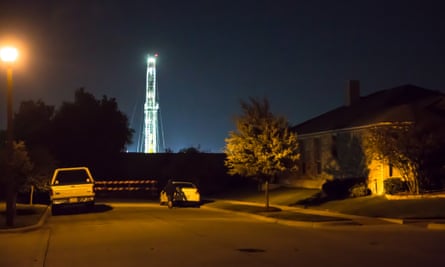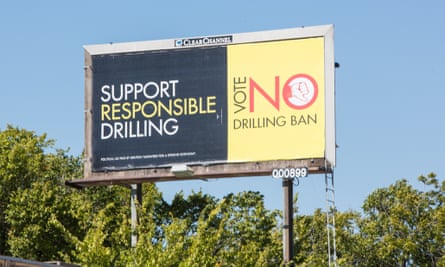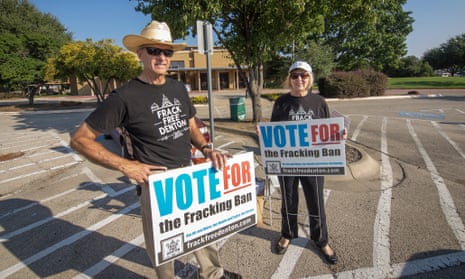The fracking ban that comes into effect on Tuesday in the heart of Texas might never have happened at all, if industry had not insisted on fracking beside a local hospital, a children’s playground, and the 100-year-old farmhouse that was Cathy McMullen’s retirement dream.
That brought fracking a step too far. McMullen believes such overreach – typical under the Texas regulatory framework – helped turn a ruby-red Republican town against fracking.
Despite industry objections – and death threats for McMullen and other activists, Denton voted by 60% to ban fracking last month. The victorious activists like to call their fight David v Godzilla, because the oil industry is so powerful in Texas. That fight is not over yet.
George P Bush, the nephew and grandson of the former presidents, will soon take charge of the General Land Office – one of two Texas state agencies that have joined an industry lawsuit to overturn the ban.
But McMullen and the small group of mainly female activists behind the ban are already inspiring towns in Texas and elsewhere that are looking for ways to rein in an industry that so far has enjoyed supreme rights to frack.
The oil and gas companies probably would be fracking still in Denton if they had not completely dismissed McMullen’s concerns, she said.
“They underestimated us completely,” she said. “I think they all just thought: ‘Oh, it’s just Cathy.’ I don’t think they saw the storm clouds on the horizon, and that industry was creating this storm, and that it was going to blow into town, and everybody was just sick of it.”

It must have seemed easy to dismiss McMullen, 56 and a home-help nurse so apolitical she had never even registered to vote until her 40s.
Over the last few years, oil companies have fracked wells in Denton churchyards and on school properties, in suburban developments, and on the campuses of two local universities. There are a total of 280 oil wells inside Denton city limits, which will go on producing under the ban.
Two of them are a few hundred feet from McMullen’s home. She and her husband, a former FBI agent, fled to the town in June 2009 to escape a well going in on the fence line of their former home on 11 acres in neighbouring Wise County.
Wise County is the birthplace of fracking, the place where the late oil man George Mitchell perfected the technique of combining horizontal drilling and hydraulic fracturing to flush oil from the rock.
But McMullen, by her own admission, was relatively clueless. All she wanted was a home for herself and her husband, and her growing menagerie of rescue animals. The couple have no children, but currently look after five dogs and a cat.
“I am ashamed to say I was one of those apathetic people who are blind to what’s going on,” she says. She had never had strong views about the oil and gas industry. She is not sure she does even now; she just thinks local people should have the right to stop industry from taking over their neighbourhoods.
The couple had been in their new house a week when McMullen looked out on to an empty field off the main road, and saw a row of five posts with pink plastic flags fluttering in the breeze. “I knew they intended to put wells there,” she said. “My heart sank.”
Her husband, Ron Watson, suggested they sell up and move on. McMullen was having none of it. “I told him: ‘If we run now, we’re going to be running forever. If we stay in Texas, we just decide to stay and fight it’.”
She talked to Sharon Wilson, a local organizer for Earthworks, and the two women began to speak to neighbours. What McMullen didn’t know, however, was that that fight would take five years.
At first, she tried to persuade the city and the oil company to move the gas wells to the other end of the open field, away from the neighbourhood, and the nearby hospital and McKenna park. The company, Range Resources, refused. The then mayor told her to let it go.
McMullen collected $3,700 from her neighbours for air quality monitors, and for water and soil samples. She kept a log of the odours coming off the well.
The wells went in anyway. Under Texas law, McMullen had no say over oil and gas activity because she did not control the mineral rights – and neither did any of her neighbours.
But McMullen, though exhausted, refused to let it end there. “I think that was the thing that just kept me going all these years: who the hell do they think are? By any stretch of the imagination, why is it OK to allow heavy industrial use right close to a hospital and a playground?” she said. “From the wellhead to the swing set was 536ft.”

A year later, the city council invited McMullen and a professor at the local university, Adam Briggle, to help draft a set of stricter regulations for fracking in the city limits.
There were many evenings when McMullen found herself the sole voice against fracking at the meetings. She never felt industry or the council took her seriously.
“They were dismissive. They were very paternal. They were: look, we know you kids don’t understand this, but we are doing this for your own good,” she said. “They were disrespectful.”
The town did eventually adopt new regulations in early 2013 imposing some restrictions on fracking. McMullen felt the new rules did not go far enough, and as it turned out, industry did not feel bound even by those relatively light restrictions.
Soon after the ordinance came in, in the summer of 2013, oil drillers began to frack two wells near a new suburban development, the Meadows at Hickory Creek, which is full of young families. McMullen and Briggle were horrified – and so were local residents.
“It was loud, constantly loud,” said Maile Bush, who has a young son and daughter, and whose home lies about 750ft from one of the well pads.
That Halloween, many parents in Hickory Creek stopped their kids from going trick or treating, because the air was so bad. Many mothers still don’t let their children play outdoors. Bush’s son, Kaden, six, began getting weekly nosebleeds. His asthma – which had been under control earlier – got much worse.
McMullen and others decided it was time to press for an outright ban on fracking. Not that anybody seriously believed it would work – certainly not the oil industry – but McMullen thought there was no choice.
“Nobody took us seriously at first, because nobody has really challenged them in the state of Texas. They figured we would be squashed. We wouldn’t get the signatures.”
McMullen, Briggle and others found a lawyer – who wishes to remain anonymous – and drafted a ballot initiative. The wording of the measure specifically banned fracking – not drilling – a tactic intended to show that opponents were not against all industry activity, McMullen said.
When the measure was put to a vote at city council last July, nearly 600 people spoke up in support of the ban. The city council voted against a ban, but the measure did go on the ballot.
Then came a hard-fought campaign, with McMullen assigned police protection after receiving death threats on Facebook. “In one of the Facebook posts, the guy was hoping that so many people would be so mad at us they would put us on a stick and burn us – and he would get to light the match,” she said.
The oil industry bankrolled an expensive counter-campaign, recruiting a former mayor and university officials to speak up for fracking. They plastered the town with flyers reading “Denton moms oppose drilling ban” and warned that the ban would hurt city schools.
But McMullen had momentum. By election day, hundreds had volunteered for the campaign, going door to door, hosting barbecues, and organising a free concert in the town square. “The camaraderie was incredible,” McMullen said. So was the sense that she had outwitted the oil industry.
“I would rather be underestimated than overestimated. If people don’t think you are going to be a challenge to them, you can fly under the radar and do what you need to do.”

Comments (…)
Sign in or create your Guardian account to join the discussion